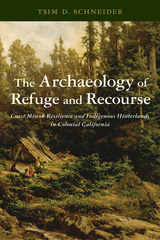
Unsettling Mobility
Mediating Mi'kmaw Sovereignty in Post-contact Nova Scotia
Since contact, attempts by institutions such as the British Crown and the Catholic Church to assimilate indigenous peoples have served to mark those people as “Other” than the settler majority. In Unsettling Mobility, Michelle A. Lelièvre examines how mobility has complicated, disrupted, and—at times—served this contradiction at the core of the settler colonial project.
Drawing on archaeological, ethnographic, and archival fieldwork conducted with the Pictou Landing First Nation—one of thirteen Mi’kmaw communities in Nova Scotia—Lelièvre argues that, for the British Crown and the Catholic Church, mobility has been required not only for the settlement of the colony but also for the management and conversion of the Mi’kmaq. For the Mi’kmaq, their continued mobility has served as a demonstration of sovereignty over their ancestral lands and waters despite the encroachment of European settlers.
Unsettling Mobility demonstrates the need for an anthropological theory of mobility that considers not only how people move from one place to another but also the values associated with such movements, and the sensual perceptions experienced by moving subjects. Unsettling Mobility argues that anthropologists, indigenous scholars, and policy makers must imagine settlement beyond sedentism. Rather, both mobile and sedentary practices, the narratives associated with those practices, and the embodied experiences of them contribute to how people make places—in other words, to how they settle.
Unsettling Mobility arrives at a moment when indigenous peoples in North America are increasingly using movement as a form of protest in ways that not only assert their political subjectivity but also remake the nature of that subjectivity.
'[Unsettling Mobility] signals exciting and ambitious studies of Wabanaki history that explore ways in which Wabanaki, and hunter-gatherers more generally, defined their homes and homelands.’—Canadian Journal of Archaeology
‘Lelièvre’s keen insight reveals that ‘mobility’ was a favored trope of missionaries and government agents determined to turn seasonally shifting harvesters into peasants tied to a small plot of land. In fact, the missionaries and government agents were the truly mobile ones, moving every few years to a different post. The book unsettles conventional views of both the Mi’kmaw economy and white political actions.’—Alice Beck Kehoe, author of A Passion for the True and Just: Felix and Lucy Kramer Cohen and the Indian New Deal‘A refreshing take on postcolonial archaeological land-use research. Lelièvre moves beyond the familiar neo-evolutionary goals of twentieth-century archaeology to more fully situate real Mi’kmaw lives with a new understanding of their varied responses to several centuries of profound political, religious, and social change. Unsettling Mobility exemplifies a welcome, more socially aware, and less bounded style of archaeology.’—George Nicholas, editor of Being and Becoming Indigenous Archaeologists
Michelle A. Lelièvre is an assistant professor in the Department of Anthropology and the American Studies Program at the College of William and Mary. She has published in Anthropological Theory, the Journal of Archaeological Science, and Anthropologica.














